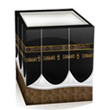Did The Prophet (sallAllaahu `alayhi wa sallam) Supplicate Against the Crow?
- Details
- Category: Sheikh Otheimin
- Published on Tuesday, 12 November 2013 10:57
- Hits: 907
Did The Prophet (sallAllaahu `alayhi wa sallam) Supplicate Against the Crow?
Question:
I heard from a brother that, on the day of his emigration, the Messenger of Allaah (sallAllaahu `alayhi wa sallam) supplicated against a crow: "May Allaah blacken your face." Is this Hadeeth authentic? If it is authentic, why did the Messenger of Allaah (sallAllaahu `alayhi wa sallam) say that?
Answer:
This narration is a fabrication - as far as I know - the Messenger of Allaah (sallAllaahu `alayhi wa sallam) didn't supplicate against the crow, not during his emigration and not during any other time. But the Messenger of Allaah (sallAllaahu `alayhi wa sallam) did mention the crow in the Hadeeth concerning the five Fawasiq (vicious animals), which are to be killed, even when a person is in a state of Ihram, he (sallAllaahu `alayhi wa sallam) said:
ÎãÓ ãä ÇáÏæÇÈ ßáåä ÝÇÓÞ íÞÊáä Ýí ÇáÍÑã ÇáÛÑÇÈ æÇáÍÏÃÉ æÇáÚÞÑÈ æÇáÝÃÑÉ æÇáßáÈ ÇáÚÞæÑ
"I here are five animals that are all Fawasiq and should be killed while not in Ihram and while in Ihram: the crow, the kite (a kind of bird), the scorpion, the mouse, and the ferocious dog." (Al-Bukhari no. 1829 and Muslim no. 1198)
Shaykh Muhammad bin Saalih al-`Uthaymeen
Fatawa Islamiyah, Vol. 7, Pages 184-185, DARUSSALAM





















